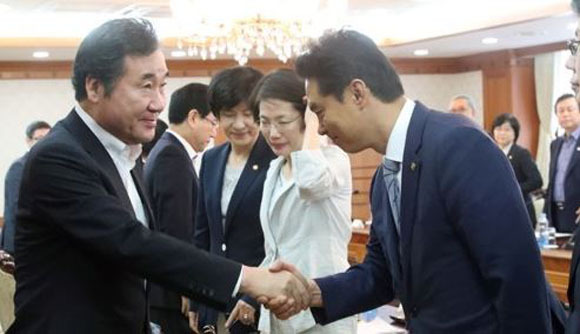Prime Minister Lee Nak-yon said Thursday that public criticism of the government's handling of the contaminated egg scare should be taken as a rebuke, not as irritation, taking a swipe at the country's food safety chief who accused Lee of expressing irritation to him.
Ryu Young-jin, minister of food and drug safety, made headlines earlier this week when he told a parliamentary committee meeting that the prime minister "expressed irritation" over his handling of the scare over pesticide-contaminated eggs.
The remark was seen as discourteous as the Korean word for irritation is mostly used in informal settings and usually toward people younger or lower than the speaker. The remark, coupled with criticism Ryu failed to act effectively to bring the situation under control, spurred speculation he could be sacked.
Ryu Young-jin, minister of food and drug safety, made headlines earlier this week when he told a parliamentary committee meeting that the prime minister "expressed irritation" over his handling of the scare over pesticide-contaminated eggs.
The remark was seen as discourteous as the Korean word for irritation is mostly used in informal settings and usually toward people younger or lower than the speaker. The remark, coupled with criticism Ryu failed to act effectively to bring the situation under control, spurred speculation he could be sacked.

On Thursday, Lee issued a thinly veiled criticism of Ryu.
"With regard to the egg scare, the government is getting a lot of rebuke from the people not only for failing to do enough oversight, but also for failing to carry out its obligation to offer adequate explanations," Lee said during an appointment ceremony for vice minister-level officials.
"This is a rebuke, not irritation," Lee said, sparking laughter from participants.
Lee pointed out that Ryu failed to do enough to dispel concern and questions people might have.
On Sunday, in an effort to calm public jitters over tainted eggs, Ryu's ministry said that it's safe for adults to consume 2.6 contaminated eggs every day for the rest of their lives.
Lee said that the ministry failed to answer follow-up questions, such as why the government is destroying all contaminated eggs if it's safe to consume them.
"We have to think about what people would be wondering and what they're concerned about and what they're suspicious about. We have to sense these in advance and think about how we can offer explanations in a way that makes them less upset and minimizes mistrust and misgivings," Lee said. (Yonhap)











![[Today’s K-pop] BTS pop-up event to come to Seoul](http://res.heraldm.com/phpwas/restmb_idxmake.php?idx=644&simg=/content/image/2024/04/17/20240417050734_0.jpg&u=)





![[KH Explains] Hyundai's full hybrid edge to pay off amid slow transition to pure EVs](http://res.heraldm.com/phpwas/restmb_idxmake.php?idx=652&simg=/content/image/2024/04/18/20240418050645_0.jpg&u=20240418181020)

![[Today’s K-pop] Zico drops snippet of collaboration with Jennie](http://res.heraldm.com/phpwas/restmb_idxmake.php?idx=642&simg=/content/image/2024/04/18/20240418050702_0.jpg&u=)